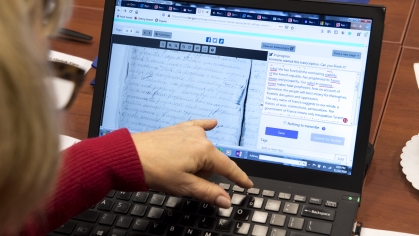Mark Lamar, Associate Professor of Professional Practice and Executive Director of the Office of Field Education, was recently profiled in the Network for Social Work Management (NSWM)'s Monday Morning Manager series.
Number of years in management:
39
Tell us about your path to management:
Before graduate school, I was a warehouse supervisor at a scaffolding construction company where I worked with both Teamsters and the company's management. That taught me the importance of relating well to all partners, treating each person with care and respect, to successfully get our work done. My first MSW job was as a child therapist in a child guidance clinic, working with social workers, psychologists and psychiatrists, where I truly began to feel how essential a well-managed staff was to the success of our clients and their families. I later became a field instructor for MSW students, and a supervisor for social work staff, learning to manage the financial, human resource, and program quality of behavioral health care service. I've been so fortunate to hold two executive roles, one as the director of a community nonprofit and the other as director of the field education office at Rutgers.
What leadership qualities do you find to be the most effective in reaching your organizational or career goals?
Leaders must, in my view, convey genuine warmth, create an environment of trust, and help all partners identify their paths to organizational success.
How do you motivate your team members?
Team members need to believe they matter, have a place, that their efforts are appreciated, even when not every idea can be put into motion. Team members are motivated by being seen and openly appreciated.
Is there a leader or mentor who has inspired or assisted you along your professional journey?
My father and mother were antiwar, civil rights and social activists (he, a Presbyterian minister, she, a humanist-internationalist) and from them I learned how our very large nation and even larger world required economic fairness and social justice. In college, I majored in history, which illustrated for me the enduring patterns of societal success or distress. Howard Zinn and Arnold Offner were my two most influential professors. Finally, my attorney-wife has, more times than I can count, inspired me to always move forward.
How has networking impacted your career?
Networking (aka, "looking in on each other") has expanded my professional and personal communities immeasurably, showing me the commonality of the commitments shared with others to important causes and providing encouragement that we are in this social work life together. Allies abound and we just need to find them - and be them.
What are you reading and/or following now (book, blog, social media groups, etc.)?
Obama's "A Promised Land", Blight's "Frederick Douglass", and Wilkerson's "Caste" have made me humbler and, I hope, smarter, more useful. The journeys of people, often against high odds, affirms the power of the self but, more importantly, illuminates the critical need for structural reforms, so that those high odds are simply no longer.
What advice do you have for those beginning their professional journey or who are already in leadership positions?
Beginners: be open to being open. Acknowledge your need to learn everything you can and readily value transparency, power-sharing, and teamwork. For those already in leader roles: recognize that leading is a privilege; recognize your obligation to others with whom you work, whether you supervise them or are supervised by them. (And please never use, validate, or embrace the word "boss." )
Do you have an initiative or project you would like to tell our readers about?
I developed a Field Skills Simulation course in fall 2020 for all new field students at Rutgers (with the considerable help of my dean, Professor Marion Bogo, faculty from our school of nursing and social work colleagues at Monmouth, Columbia and SUNY Buffalo). Although we had planned for an in-person course, Covid-19 prevented that, so three field faculty colleagues and I taught the class via Zoom. Students learned critical social work interview skills, engaging and assessing simulated micro and macro clients. Evaluation and feedback played an important role, as students took risks in structured simulations. The course was evaluated very positively by students, and we will expand it this year, with new cases and simulation resources available to students outside of the class who need to practice their micro and macro interviewing skills in a lab. We hope to do this in person.
What do you wish you had known before you started your career?
Hard to say, actually. I suspected that social work would be the right path for me and that has been confirmed, over and over, with each new experience.
Share a mistake or failure that provided the most growth in your career.
It took me a while to realize that "scarcity" is truly a political, rather than a finite, dimension. We can - must - always advocate for, demand, identify, and provide more of what people need.
*The views expressed herein are those solely of the author and not necessarily endorsed by the Network for Social Work Management.



